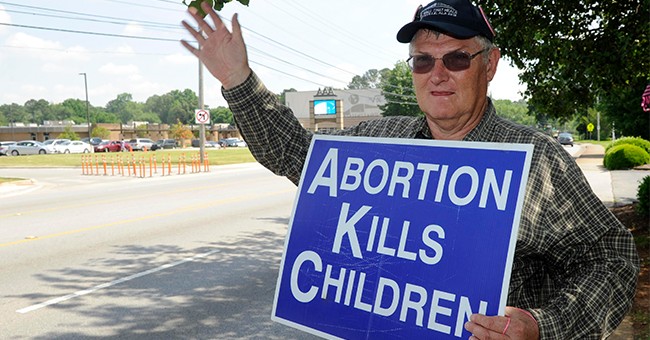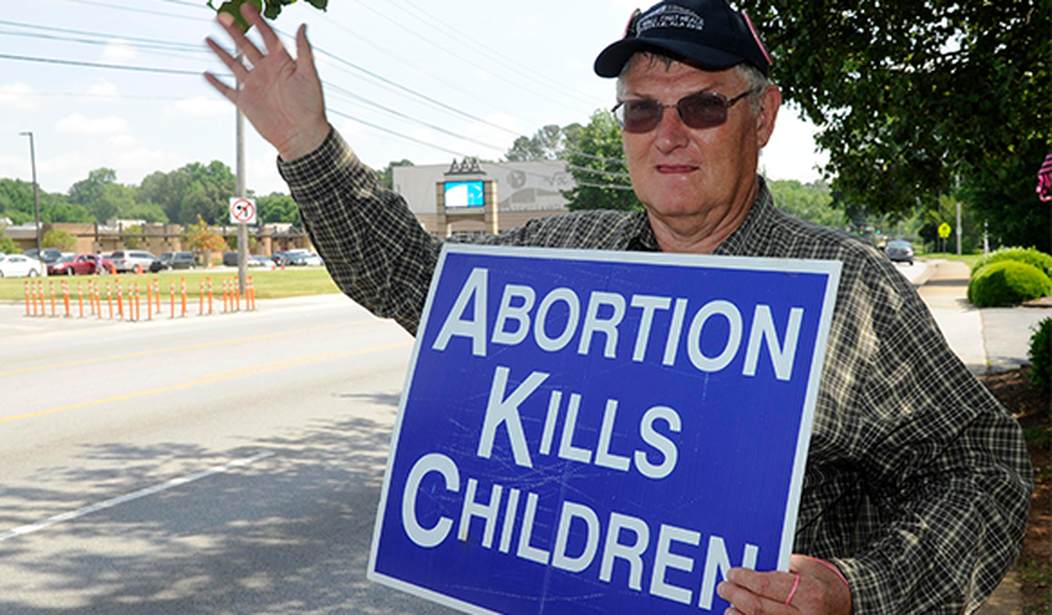
Jim Snively, of Huntsville, waves to passing cars while holding an anti-abortion sign in front of the Alabama Women’s Wellness Center Friday, May 17, 2019, in Huntsville, Ala. The Alabama legislation signed into law Wednesday would make performing or attempting to perform an abortion at any stage of pregnancy a felony. The ban does not allow exceptions for rape and incest. (AP Photo/Eric Schultz)
It’s official. The ban on abortions in Texas will continue despite the abortion industry’s best efforts in keeping what are, very clearly, elective surgeries going.
According to CBS News, the Fifth Circuit Court of Appeals ruled on Tuesday that abortions aren’t medically necessary and as such will be halted for the duration of the pandemic:
Texas can continue to legally implement its near-total ban on abortion services amid the coronavirus outbreak, the Fifth Circuit Court of Appeals ruled Tuesday afternoon. Abortion services in Texas have been unavailable for more than two weeks, driving some patients to seek the procedure in neighboring states or terminate their pregnancy themselves.
Per guidance from Texas Attorney General Ken Paxton, any abortion “not medically necessary to preserve the life or health” of the patient must be halted as part of the state’s directive suspending “non-essential” medical procedures amid the coronavirus pandemic. Doctors who violate the order face “penalties of up to $1,000 or 180 days of jail time.”
This is great news — or should be, at least. The problem is that the ban came with some words from the bench that will rub you the wrong way. Judge Kyle Duncan and Judge Jennifer Walker Elrod ruled that Texas’s ban was constitutional, but wrote in their decision that in times of an emergency, our leaders can suspend parts of the constitution according to ABC News:
“The bottom line is this: when faced with a society-threatening epidemic, a state may implement emergency measures that curtail constitutional rights so long as the measures have at least some “real or substantial relation” to the public health crisis,” Judge Duncan and Judge Elrod wrote.
Abortion isn’t in the Constitution, ergo it isn’t a constitutional right as dissenting Judge Kyle Dennis wrote:
Judge Kyle Dennis, appointed by President Bill Clinton, dissented, writing: “In a time where panic and fear already consume our daily lives, the majority’s opinion inflicts further panic and fear on women in Texas by depriving them, without justification, of their constitutional rights, exposing them to the risks of continuing an unwanted pregnancy, as well as the risks of travelling to other states in search of time-sensitive medical care.”
So my question is, why bring up the Constitution in a decision surrounding abortion? Why say that states have the power to suspend certain rights in the event of an emergency?
I’m afraid that this may open the door rather widely for abuses down the line. While the judges make it clear that the suspension of rights must have “at least some “real or substantial relation” to the public health crisis,” I’ve seen many a Democrat use the flimsiest of evidence to impose unreasonable laws on the people in the name of “safety.”
Case in point, all over the nation, various local governments attempted to shut down our 2nd Amendment rights during this quarantine. We were lucky that we had judges in place that disallowed this kind of thing but that won’t be the case forever. At some point, statists and authoritarians will come back into power. Even blood-red states like Texas won’t be blood-red in perpetuity. At some point, power will be abused.
I’m thrilled that abortions have been stopped, if even for a short time. I’m not, however, thrilled with the accompanying verbiage that came with it. If we’re going to ban abortion then we can do so with clear consciences. However, adding that there can be a suspension of rights in an emergency is a bridge too far.














